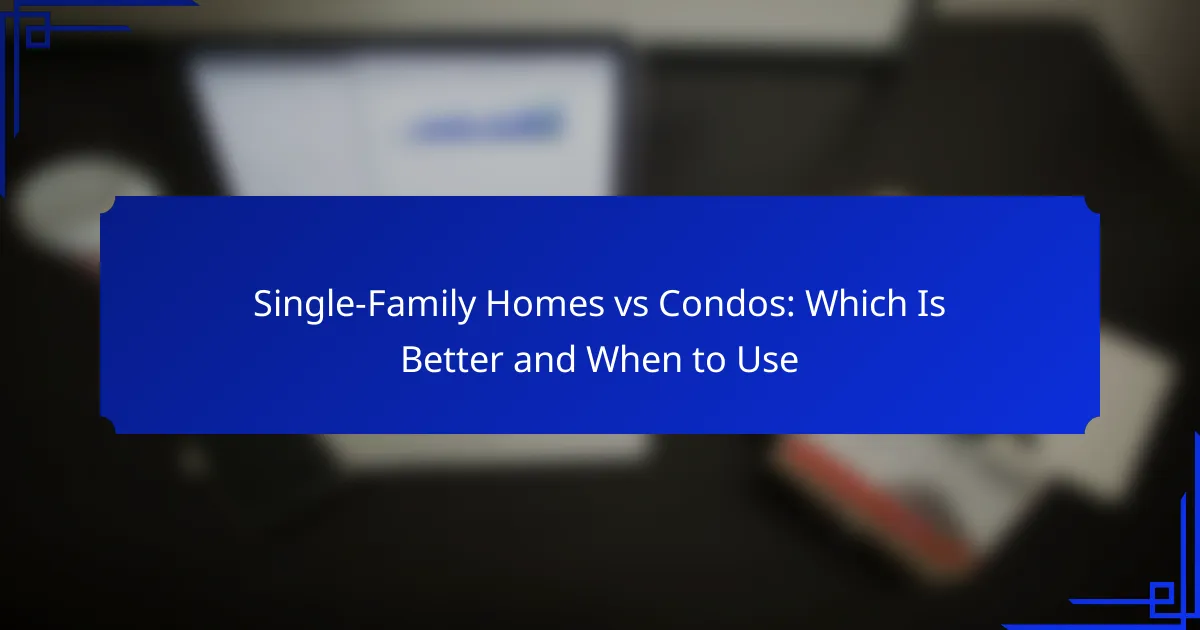When deciding between single-family homes and condos, it’s essential to consider your lifestyle and priorities. Single-family homes provide more space, privacy, and potential for property appreciation, making them ideal for families seeking stability. On the other hand, condos offer convenience and lower maintenance, appealing to busy professionals and those who value access to amenities. Understanding these differences can help you make an informed choice that aligns with your needs.

What are the advantages of single-family homes in urban areas?
Single-family homes in urban areas offer several advantages, including increased privacy, more space, and the potential for property appreciation. These benefits make them an appealing choice for families and individuals seeking a stable living environment in bustling cities.
More privacy and space
Single-family homes typically provide greater privacy compared to condos, as they are standalone structures rather than units within a larger building. This separation allows residents to enjoy their own outdoor space, such as yards or gardens, which is often not available in condo living.
Additionally, single-family homes usually offer more square footage, accommodating larger families or those who desire extra room for hobbies, work, or entertaining guests. This extra space can significantly enhance the quality of life for residents.
Potential for appreciation
Investing in a single-family home can lead to significant appreciation over time, particularly in urban areas where demand for housing is high. Homes in desirable neighborhoods often see value increases that can range from moderate to substantial, depending on market conditions.
Homeowners can benefit from this appreciation when they decide to sell, potentially yielding a profit that can be reinvested or used for other financial goals. Understanding local market trends is crucial for maximizing this potential.
Greater control over property
Owning a single-family home grants residents greater control over their property compared to condo ownership, where rules and regulations may be imposed by a homeowners’ association (HOA). Homeowners can make decisions about renovations, landscaping, and other modifications without needing approval from an HOA.
This autonomy allows for personalization of the living space, which can enhance both comfort and property value. However, it also comes with the responsibility of maintaining the property, which is an important consideration for potential buyers.

What are the advantages of condos in urban areas?
Condos in urban areas offer several advantages, particularly for those seeking a convenient lifestyle. They typically require less maintenance and provide access to various amenities, making them appealing for busy professionals and families alike.
Lower maintenance responsibilities
One of the primary benefits of condos is the reduced maintenance responsibilities. Unlike single-family homes, where owners must manage landscaping, repairs, and upkeep, condo owners often pay a monthly fee that covers these tasks. This arrangement allows residents to focus on their daily lives without the burden of home maintenance.
Additionally, many condos have on-site management teams that handle repairs and maintenance issues promptly, ensuring that the property remains in good condition. This can be particularly advantageous for those who travel frequently or have demanding jobs.
Access to amenities
Condos often come with a range of amenities that enhance the living experience. Common features include fitness centers, swimming pools, rooftop terraces, and community lounges. These facilities can provide a sense of community and opportunities for socializing without the need to leave the building.
Moreover, many urban condos are strategically located near public transportation, shopping centers, and restaurants, making it easy for residents to enjoy city life. This access to amenities can significantly improve quality of life, especially for those who prefer an active lifestyle.
Affordability in prime locations
Condos can be a more affordable option for homebuyers looking to live in prime urban locations. While single-family homes in desirable areas can be prohibitively expensive, condos often present a more budget-friendly alternative. Prices can vary widely, but many condos are available in the low to mid hundreds of thousands of dollars, making them accessible to a broader range of buyers.
Furthermore, the lower purchase price of condos often translates to lower property taxes and insurance costs compared to single-family homes. This financial advantage can make urban living more attainable for first-time buyers or those looking to downsize.

When should you choose a single-family home over a condo?
Choosing a single-family home over a condo is ideal when you prioritize space, privacy, and outdoor areas. These homes typically offer more room for families and can serve as a long-term investment opportunity.
For families needing space
Single-family homes generally provide more square footage than condos, making them suitable for families who require extra space for children, pets, or hobbies. With multiple bedrooms and bathrooms, these homes can accommodate larger families comfortably.
Additionally, single-family homes often feature separate living areas, which can enhance privacy and reduce noise. This layout is beneficial for families with varying schedules or those who value personal space.
When seeking long-term investment
Investing in a single-family home can be advantageous for long-term financial growth. These properties tend to appreciate in value over time, particularly in desirable neighborhoods, making them a solid choice for future resale.
Moreover, single-family homes often have lower homeowner association (HOA) fees compared to condos, allowing for greater control over maintenance costs and property modifications. This can lead to a better return on investment in the long run.
For those desiring outdoor space
Single-family homes typically come with private yards, gardens, or patios, offering outdoor space for recreation, gardening, or entertaining. This is especially appealing for families with children or pets who need room to play.
Having a dedicated outdoor area also allows homeowners to personalize their space, whether through landscaping, outdoor furniture, or recreational installations like pools or playgrounds. This flexibility is often limited in condo living, where shared spaces dominate.

When should you choose a condo over a single-family home?
Choosing a condo over a single-family home is often ideal for those seeking affordability, convenience, and community. Condos typically require less maintenance and can be more budget-friendly, making them a suitable option for various lifestyles.
For first-time homebuyers
First-time homebuyers often find condos appealing due to their lower price points compared to single-family homes. This affordability allows buyers to enter the housing market without stretching their finances too thin. Additionally, many condos come with amenities that enhance the living experience, such as pools and gyms.
Moreover, condos usually require less upkeep, which is beneficial for those new to homeownership. With homeowners’ associations (HOAs) managing common areas, first-time buyers can focus on settling in rather than worrying about extensive maintenance tasks.
When prioritizing convenience
Condos are often located in urban areas, providing easy access to public transportation, shopping, and dining. This convenience is particularly appealing for individuals who prefer a lifestyle with minimal commuting. Living in a condo can save time and money, making it a practical choice for busy professionals.
Additionally, many condos offer features like on-site maintenance and security, which enhance the overall convenience of living. This means residents can enjoy a worry-free lifestyle without the burdens of managing a yard or exterior repairs.
For those wanting community living
Condos foster a sense of community, making them ideal for individuals who value social interaction. Shared spaces, such as lounges and gardens, encourage residents to connect and build relationships. This communal aspect can be particularly beneficial for those moving to a new city or looking to expand their social circle.
Furthermore, living in a condo often means participating in community events organized by the HOA, which can enhance the living experience. Engaging with neighbors through these activities can create a supportive environment, making it easier to feel at home.

What are the financial considerations for single-family homes vs condos?
When deciding between single-family homes and condos, financial considerations include mortgage rates, down payments, property taxes, insurance, and potential HOA fees. Understanding these factors can help you make an informed choice based on your budget and lifestyle preferences.
Mortgage rates and down payments
Mortgage rates for single-family homes and condos can vary, but they are generally similar. Typically, lenders may require a down payment of around 20% for single-family homes, while condos might allow lower down payments, sometimes as low as 3% to 5%, depending on the lender and the buyer’s qualifications.
Consider your financial situation when choosing between the two. A larger down payment on a single-family home can lead to lower monthly payments and less interest paid over time, while a smaller down payment on a condo may allow you to enter the housing market sooner.
Property taxes and insurance
Property taxes for single-family homes are often higher than for condos, as they are based on the home’s assessed value and local tax rates. In contrast, condo owners typically pay lower property taxes, but they should be aware that taxes can still vary significantly based on location.
Insurance costs can also differ. Single-family homes usually require homeowners insurance, which covers the structure and personal property. Condos, on the other hand, often require a specific type of insurance called HO6, which covers personal property and liability but not the building itself, as that is typically covered by the condo association’s master policy.
HOA fees for condos
Condominiums often come with Homeowners Association (HOA) fees, which cover shared amenities, maintenance, and sometimes utilities. These fees can range from modest amounts to several hundred USD per month, depending on the services provided and the location of the condo.
When considering a condo, it’s crucial to factor in these HOA fees into your overall budget. Additionally, review the HOA’s financial health and rules, as they can impact your living experience and future costs.

How do maintenance responsibilities differ?
Maintenance responsibilities vary significantly between single-family homes and condos. In single-family homes, owners are fully responsible for all upkeep, while condo owners share some responsibilities with the homeowners association (HOA).
Single-family home upkeep
Owning a single-family home means you handle all maintenance tasks, from lawn care to roof repairs. This can include regular tasks like mowing the lawn, cleaning gutters, and maintaining HVAC systems. Homeowners should budget for these expenses, which can range from a few hundred to several thousand dollars annually, depending on the home’s size and condition.
It’s crucial to stay proactive with maintenance to prevent larger issues. For example, regular inspections of plumbing and electrical systems can save significant costs down the line. Homeowners should also consider seasonal tasks, such as winterizing outdoor faucets or checking for pest infestations in the fall.
Condo upkeep
In a condo, maintenance responsibilities are often shared with the HOA, which typically covers exterior repairs, landscaping, and amenities. This can significantly reduce the individual workload for owners, allowing them to focus on interior upkeep. However, condo owners are still responsible for maintaining their units, including appliances and plumbing.
HOAs usually charge monthly fees that fund maintenance and repairs, which can vary widely based on the amenities offered. Owners should review the HOA’s rules and fees carefully, as these can impact overall living costs. Additionally, understanding the HOA’s maintenance policies can help avoid disputes over responsibilities.
